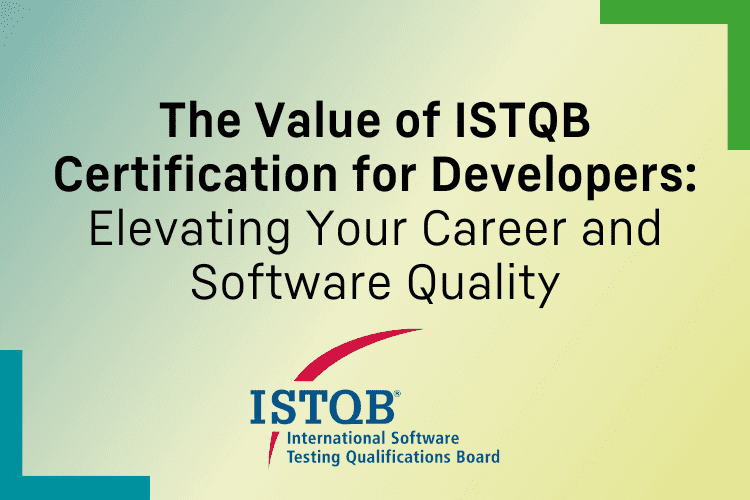by Aseel Al-Dabbagh
Share
by Aseel Al-Dabbagh

Reliable software development and the creation of durable applications depends in part on quality assurance (QA). The International Software Testing Qualifications Board (ISTQB) provides the certification with the highest level of recognition. This certification not only equips developers with essential testing knowledge but also bridges the gap between development and QA teams, fostering better collaboration and product outcomes.
Understanding ISTQB
The ISTQB offers a globally recognized certification program designed to standardize the knowledge base for software testing professionals. With levels ranging from Foundation to Advanced and Expert, ISTQB covers a broad spectrum of topics from basic principles to complex testing methodologies and management practices. This structure ensures that regardless of your current level of expertise, there’s a pathway for you to enhance your testing knowledge and contribute more effectively to your projects.
The Benefits of ISTQB Certification for Developers
Improved Testing Knowledge
For developers, ISTQB certification provides a deep dive into the world of testing. It covers various testing methodologies, types of testing, and the tools and techniques used in the process. This knowledge is invaluable for writing more effective and efficient test cases, understanding the nuances of different testing approaches, and applying best practices in day-to-day development work.
Better Understanding of the SDLC
Software development is not just about writing code; it’s about delivering a product that meets user needs and quality standards. ISTQB certification offers insights into the Software Development Life Cycle (SDLC), highlighting the role of testing at each stage. For developers, this means a better understanding of how their work fits into the larger project ecosystem, leading to more strategic thinking and planning in their contributions.
Enhanced Communication with QA Teams
One of the perennial challenges in software development projects is the communication barrier between developers and QA teams. ISTQB certification provides the tools to break down these barriers with a common language and framework for discussing testing processes and results. This shared understanding facilitates more effective collaboration, quicker identification of issues, and a more streamlined approach to achieving project objectives.
Increased Job Opportunities
In a competitive job market, ISTQB certification can be a significant differentiator for developers. It signals to potential employers a commitment to quality and a proactive approach to professional development. Many organizations value the ISTQB certification and prefer candidates who possess it, recognizing the direct impact of testing knowledge on project success.
Career Development
Beyond the immediate project benefits, ISTQB certification opens up new opportunities in a software quality career. Whether you’re interested in transitioning to a QA role, aspiring to become a test manager, or simply looking to enhance your development career, ISTQB provides the foundation and credentials to explore these opportunities.
Choosing the Right ISTQB Certification for You
The ISTQB certification path gives developers a choice: which level of certification to pursue? These are the possibilities:
Foundation Level Certification
Ideal for developers new to testing or seeking to solidify their understanding of basic testing principles. It provides a broad overview, making it perfect for those aiming to improve code quality and collaboration.
Advanced and Expert Level Certifications
For those looking to specialize further, these certifications go deeper into complex testing disciplines, suitable for developers aiming for roles involving complex testing responsibilities or leadership in QA teams.
Real-world Applications
Developers can leverage their ISTQB knowledge to contribute to test planning, execute more comprehensive unit tests, and work more closely with QA teams on automated testing strategies. This not only improves the software quality but also enhances job satisfaction.
A Start in ISTQB
Getting ISTQB certified involves studying the syllabus, selecting a study method, and passing the certification exam. The Foundation Level Certification serves as a prerequisite for the advanced certifications, making it the first step for developers looking to deepen their testing knowledge.
Conclusion
For developers looking to deepen their understanding of software testing and quality assurance, ISTQB certification offers a comprehensive and structured pathway to achieving these goals. It enhances software quality, fosters better collaboration, and opens new career opportunities. Whether you’re starting with the Foundation level or aiming for Advanced or Expert certification, ISTQB equips you with the knowledge to elevate your career and the quality of your projects.




